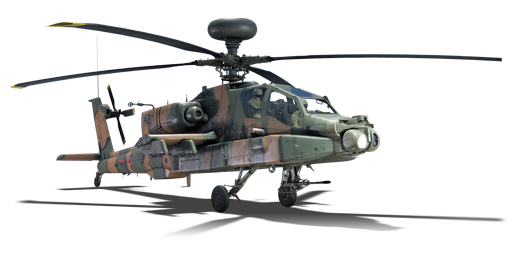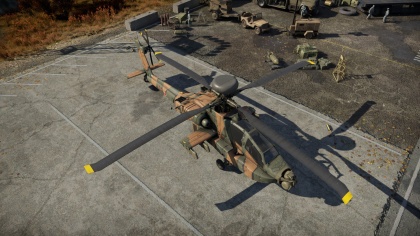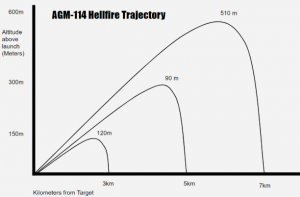AH-64DJP
Contents
Description
The AH-64DJP is a rank VII Japanese attack helicopter
with a battle rating of 10.7 (AB), 11.0 (RB), and 10.3 (SB). It was introduced in Update "Starfighters".
General info
Flight performance
The AH-64DJP, provides great manoeuvrability, incredible acceleration and overall providing a great speed of up to 320 km/h in arcade and 295 km/h in realistic and simulator game modes. As fast as the United States Army, AH-64D Longbow and slower than the British Army, AH Mk.1 variants of this. Despite this the AH-64DJP is still able to do same manoeuvres other helicopters can only dream about, from barrel roles, flips to loops which allow it to evade enemy missiles with ease.
| Characteristics | Max Speed (km/h at 1,000 m) |
Max altitude (metres) | |
|---|---|---|---|
| AB | RB | ||
| Stock | 269 | 249 | 5,400 |
| Upgraded | 320 | 295 | |
Survivability and armour
The AH-64D Apache longbow, has only limited armour protection installed with bullet proof glass only being installed on the pilot windscreen. The helicopter uses Kevlar boron carbide, composite martial which is limited only to instrument, floor and side panels around the cockpit. It does not provide the same level of protection as seen on other helicopters such as the Mi-28N.
- Bullet proof glass installed only for the pilot - 22 mm thick.
- Installation of Kevlar boron carbide, composite martial only on the: Seats, cockpit side panels, Gunner floor panels and pilot instrument panel - 20 mm thick.
Armaments
Offensive armament
The AH-64DJP is armed with:
- A choice between two presets:
- 1 x 30 mm M230E-1 cannon (1,200 rpg)
- 1 x 30 mm M230E-1 cannon (1,200 rpg) + 4 x AIM-92 Stinger missiles
- 1 x 30 mm M230E-1 cannon (1,200 rpg) + 4 x AIM-92 Stinger missiles + flares x30
Suspended armament
The AH-64DJP can be outfitted with the following ordnance:
- 76 x Hydra-70 M247 rockets
- 8 x AGM-114K Hellfire II missiles
- 4 x AGM-114K Hellfire II missiles + 38 x Hydra-70 M247 rockets
- 8 x AGM-114K Hellfire II missiles + 38 x Hydra-70 M247 rockets
- 16 x AGM-114K Hellfire II missiles
Defensive systems
The AH-64DJP only has the following Defensive systems installed:
- F-Flares - Up to 30 flares can be installed.
- AIM-9/ICM - Aim 92 stingers and Infrared Counter Measures.
When unlocked, flares are not installed - this requires the Flares module (tier I) to be researched and installed, this provides up to 30 F-Flares. The last module called AIM-9/ICM (tier III) allows for the installation of a maximum of four AIM-92 stinger missiles, which two are mounted on each wing tip, 30 F-Flares & IRCM module.
Important note: unlike the American and British brothers, the AH-64DJP lacks MAW (missile approach warning). What this means, is that the AH-64JDP player should keep an extra eye on SPAAs and incoming SAMs bu himself, without a system that warns him and show the direction of the SAM, and deploy flares manually, as MAW deploys them automatically, which again, is a system that the AH-64JDP lacks.
Usage in battles
Overview:
The AH-64DJP is very similar to the AH-64D Apache. The only difference is the lack of an ability to carry an advanced MAW (a system that alerts the pilot to incoming missiles, Missile Alert Warning). The Apache is an excellent helicopter for attacking ground targets, and can also hold its own against many enemy aircraft. Through adequate use of cover, teamwork, and game sense, the Apache can easily dismantle enemy teams. An Apache pilot must understand all of the tools at their disposal.
The Apache has an arsenal of weapons. The most effective anti-tank weapon in the Apache's arsenal is the AGM-114 Hellfire, which uses a top attack trajectory to destroy ground vehicles. There is functionally very little difference between the AGM-114B and K variants, used on early and late Apaches respectively.
Staying Alive:
Flying the Apache effectively can be more difficult than most players would imagine, processing information from optical sights, radar displays, and the radar warning receiver all at once can lead to information overload. If distracted by irrelevant information, a pilot can quickly lose situational awareness. Being successful in the Apache requires situational awareness above all else. Due to the fragility of the helicopter, any blindspot can lead to a quick and sudden death. Additionally, the mobility of the Apache is adequate but not impressive, so evasive manoeuvres are not always effective.
Using cover is a very important part of staying alive in the Apache. Always stay behind a hill or building in ground battles. When exposing yourself in order to fire on the enemy, be mindful to not gain too much altitude. Most importantly, Always listen to your RWR and MAW. If you hear an alarm, take evasive action immediately.
The biggest improvement of the later Apache variants is the ability to mount the Longbow radar system. This system, if used properly, will help maintain situational awareness.
Additionally, it is important to know when to use flares. Flares are extremely effective against heat-seeking missiles, but useless against any other missiles. It is the responsibility of the Apache pilot to recognize the threat and decide whether to use flares or not. For Apaches with MAW (missile approach warning), there is an option for flares to be dispensed automatically.
Using the Longbow Radar:
The radar of the Apache should be used as a secondary tool when engaging ground targets. As of update 1.99.1.45, the radar is not effective in obtaining target lock for ground vehicles. The AGM-114L radar guided Hellfire is not in the game, so guidance of Hellfires should be done by using the FLIR thermal imaging camera to lase targets. However, the radar is still useful in detecting enemy aircraft. By using the multi-function menu to switch radar mode, the radar will begin to search for air rather than ground targets. Keeping track of enemy aircraft is vital to survival in the Apache, as any plane can make quick work of the Apache if the helicopter is unprepared.
Air-to-Air (Stinger and Gun):
The Apache is surprisingly potent in air-to-air combat. Engagements should be conducted primarily through the use of the Stinger missile. The Stinger is a simple but effective air-to-air missile. It has an excellent seeker head and can obtain all aspect lock on almost any air target within 3-5 km (even propeller aircraft with a low heat signature). However, the Stinger can be easily fooled by flares or outmanoeuvred by a fast enemy aircraft. The best way to use the Stinger against enemy aircraft is when they are heading directly towards you. If fired at the right second, most enemies will struggle to dodge a Stinger.
If the enemy gets close, the 30 mm autocannon can be extremely effective. The gun will automatically aim with optical lock, so Apache pilots can aim accurately while taking evasive manoeuvres.
Close Range Air-to-Ground (Gun and Rockets):
At close range, the Apache has excellent offensive capability. The 30 mm autocannon is incredibly accurate even at surprisingly far distances. This cannon uses a High Explosive Dual Purpose round that can engage lightly armoured targets. Rocket pods can also be used, with the CCIP computer helping maintain accuracy even at further distances. Be careful when trying to use the Hellfire missile at close range. It can do a direct attack at closer ranges (rather than its usual top attack) but if fired at an odd angle, it may not have time to manoeuvre onto the target if fired at closer ranges.
The problem with trying to engage at close range is that doing so will put the Apache in huge amounts of danger. Enemy tanks will be able to quickly destroy the Apache with their main guns or anti-aircraft machine guns.
Long Range Air-to-Ground (Hellfire):
At longer ranges, the Hellfire missile can be used to full effect. The Hellfire will guide on its target as shown in the attached diagram. This is known as top attack. Being that it takes this path to the enemy target, the Hellfire can take upward of 30 seconds to reach its target at longer ranges. Do not fire at enemies that are about to move to cover, and make sure to fire multiple missiles at once in order to deal maximum damage. Because the Hellfire is laser guided, multiple missiles can be fired at once. They should be fired at intervals of 5-10 seconds, where between missiles the Apache can switch to a new ground target. This will allow for the quick destruction of multiple enemies. This tactic can be incredibly effective. Although the time to target for the most recently fired Hellfire is available on the HUD, pilots will have to keep track of all the missiles they have fired by memory and quick calculations.
Combatting enemy anti-aircraft vehicles can be a challenge. Always remain in cover and move unpredictably in combat. Use the radar warning receiver to obtain the general direction of enemy AA, and then attack with a Hellfire. An effective strategy is to fire a Hellfire, break optical lock to gain cover and avoid counterfire, and then pop back up and get lock again several seconds before the Hellfire hits. This strategy if applied correctly will result in a hit, as the Hellfire is smart enough to begin following the laser designator again once the Apache re-obtains its lock.
Modules
| Tier | Flight performance | Survivability | Weaponry | |||
|---|---|---|---|---|---|---|
| I | Compressor | Flak jacket | Flares | New 30 mm cannons | ||
| II | Helicopter frame | AGM-114 | ||||
| III | Engine | Replacing helicopter blades | NVD | AIM-92/ICM | ||
| IV | Cover | AGM-114 2 | ||||
Pros and cons
Pros:
- Excellent attack capabilities: Rockets, anti-air missiles, long-range ATGMs with high pen and a versatile, flexible 30mm cannon that can engage both air and light ground targets, and a ground radar to spot all of these targets.
- Excelent anti air capabilites: Air radar, 4 stinger AAMs and a 30mm cannon with high damage.
- Amazing speed, acceleration, climb and roll. Very maneuverable helicopter.
- Very survavaible (Compraed to other helis) with 2 crew memebers, and a beefy air frame.
- Longbow radar that can detect both air and ground units.
- Sports a thermal sight, to make spoting and engaging targets much easier.
- The chin cannon has plenty of ammo, deals a lot of damage to air targets and can easily take out light ground targets/MBTs from their roof.
- Hellfire ATGMs have a timer to show you when theiy will hit the target, giving you the exact time to return to cover.
- Can launch and guide several ATGMs at the same time.
Cons:
- Hellfire missiles are slow, so utilizing their long range is hard due to very long flight times.
- Lacks MAW (missile approach warning) which is a very important system for top helicopters.
- Has only 30 flares
- While they can in theory hit air targets, Hellfire ATGMs wont hit air targets 99% of the time.
- 30mm cannon is innacurate, especially noticeable when engaging targets over 1km away.
History
The AH-64D was selected by the Japanese Ground Self-Defense Force (JGSDF) in 2001, with a requirement for about 50 helicopters. 50 were ordered, and they were built by the Japanese Fuji Heavy Industries as the AH-64DJP (JP standing for Japan). The first AH-64DJP was delivered in 2006, but the order was cancelled after the delivery of only 13 helicopters. The AH-64DJP has the possibility of equipping AIM-92 Stinger air-to-air missiles (AAMs).
In 2017, it was announced that the AH-64DJP helicopters were to have their targeting systems upgraded by the American Lockheed Martin defense firm. According to a press briefing from April 26 of 2017, the upgrade was to the Modernized Target Acquisition Designation Sight/Pilot Night Vision Sensor (M‑TADS/PNVS). The M-TADS is the laser designator that allows the targeting of the AGM-114 Hellfire missiles, while the PNVS assists with safe flight in day, night, and adverse weather missions. The contract was for the delivery of 14 Modernized Day Sensor Assembly (M-DSA) laser designator kits. The M-DSA increases the reliability of the laser designator and also increases the precision of the system. Additionally, Lockheed Martin’s Apache sustainment team was to provide performance-based logistics support to the JGSDF under a separate three-year contract. Japan was the first Apache operator to receive the M-DSA upgrade.
As of 2017, the JGSDF operated one squadron of ten AH-64DJP helicopters, with the other three acting as training helicopters. One AH-64DJP was destroyed in a crash in February 2018, resulting in the deaths of both crew members; this left a total of 12 AH-64DJP helicopters.
Media
Excellent additions to the article would be video guides, screenshots from the game, and photos.
See also
- AH-64A, AH-64A Peten, and AH-64D - Variants found in the American tree. The AH-64DJP is an export model of the American AH-64D.
- Mi-35M and Ka-50 - Russian helicopters at the same rank.
- EC-665 Tiger HAP - French helicopter at the same rank.
External links
- https://en.wikipedia.org/wiki/Boeing_AH-64_Apache - AH-64 on Wikipedia.
- https://www.helis.com/database/model/AH-64DJP-Apache/ - AH-64DJP on Helis.com.
- https://www.milavia.net/news/2006/first-ah-64djp-delivered-to-the-jgsdf.html - AH-64DJP on MILAVIA.
| Fuji Heavy Industries, Ltd. (富士重工業株式会社) | |
|---|---|
| Utility | UH-1B Hiyodori* |
| Attack | ▅AH-1E* · AH-1S* · AH-1S Kisarazu* |
| AH-64DJP* | |
| *Licensed | |
| Fuji Heavy Industries traces its roots to the Nakajima Aircraft Company. At the end of World War II, Nakajima was broken up by the Allied Occupation government, and by 1957 part of the separated company was already known as Fuji Heavy Industries.
Fuji Heavy Industries was renamed to Subaru Corporation from 2017 onward. | |
| See also | Nakajima Aircraft Company (1918-1945) · Bell Aircraft Corporation · Boeing Aircraft |
| Japan helicopters | |
|---|---|
| Utility | ▅UH-1B |
| Attack | ▅AH-1E · AH-1S · AH-1S Kisarazu |
| AH-64DJP | |






